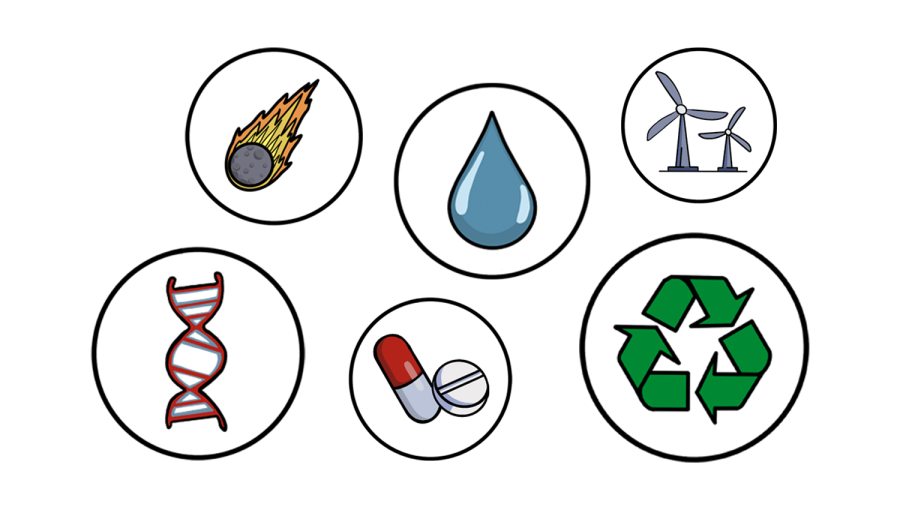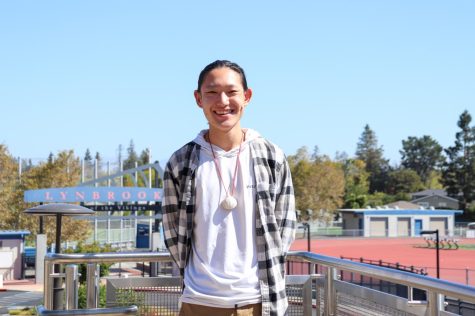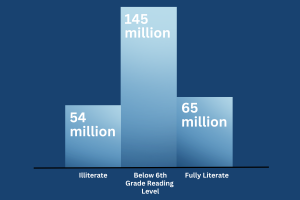Science and Society catalyzes a new way to learn
Graphic illustration by Katie Chin
Science and Society will leverage project-based learning to create a more accessible course that develops students’ critical-thinking skills and grows their capacity for independent research.
March 8, 2022
While the typical science class consists largely of lectures and assessments, with labs sprinkled in between, Science and Society approaches science education through hands-on application, allowing students to design products to address societal issues. The new course will be offered to sophomores, juniors and seniors at all FUHSD schools in the 2022-23 school year.
“The rationale behind the course was that a lot of current science courses have curricula designed to get students prepared for a multiple choice exam, as in the case of AP classes,” said Kyle Jones, Monta Vista High School science teacher and the course design team lead. “We wanted a course that was going to focus more on learning about science and applying it in a meaningful way to real-world issues.”
The Environmental Science course previously offered at certain FUHSD schools faced issues regarding equity and class demographics, so the district ultimately decided to phase out the course. Doing so created an opportunity for a new science class, leading to the birth of Science and Society, which focuses on student accessibility and a unique type of learning through projects.
“The curriculum was designed to be representative of the student body across all five schools,” said Denae Nurnberg, FUHSD’s coordinator of data and assessment. “To design a course that is accessible to all, we kept in mind students who are language learners or are in the special education department and engaged in conversation with teachers and staff, while also maintaining high ceilings for interested students.”
Development for the course began in 2021 with a visioning committee that outlined the mission of the course and what it would look like. The committee, composed of representatives from each FUHSD school, decided early on to make the course project-based to appeal to a wider range of students. As such, teachers working on the curriculum attended a week-long summer workshop on project-based learning hosted by the Buck Institute for Education.
“The theory of project-based learning, or PBL, is that teachers will present a problem upfront at the beginning of a unit,” said Zenas Lee, former FUHSD science curriculum lead and current new teacher mentor. “The teachers would tell the students, ‘We’re going to solve this problem together.’ Students are going to have divergent thinking, which allows for multiple angles to tackle the same problem.”
Science and Society is UC-accredited, meaning that students who take the class receive credit in the ‘D’ subject area for either physical or life science. It is expected that class homework will be less time-consuming compared to other science courses, with the bulk of the work being done in class. However, the course still encompasses a deep breadth of material, following the guidelines set by Next Generation Science Standards, a science framework adopted by twenty states including California.
“NGSS redefines how we learn science,” Lee said. “Traditionally, the way many science courses used to be taught was: The teacher presents facts, students memorize those facts and then students demonstrate to the teacher that they’ve memorized the facts. Instead, we want the Science and Society course to be structured as a space for students to act and think like scientists. In place of a lecture, students will investigate a question or design their own experiments to analyze what the data is telling them rather than being told what the data is saying.”
Science and Society will not only leverage project-based learning to develop students as critical thinkers but also grow their capacity for independent research. The course will hone students’ abilities to weed out misinformation, document credible evidence and be thoughtful in how they best utilize their research, skills that are useful in daily life as well.
“A greater hope I have for this class is that it instills a sense of scientific responsibility in students,” said Thanh Nguyen, Lynbrook Physics teacher and lead of the space mining unit. “An important and often-overlooked part of being a good scientist is applying one’s knowledge and skills in a thoughtful, mindful manner, taking into consideration the broader and long-term societal effects of one’s actions.”
Following an introductory unit, the course covers six main units including ones involving addiction, space mining and human genetics. The curriculum behind the units is largely created and developed by FUHSD science teachers.
Each unit follows a similar timeline: In the first week, students are taught the basics of the unit as an entryway to the topic. In the second week, students complete labs to further their understanding. From the third to the fifth week, students form groups to research, design and create a product that addresses a societal issue within the unit. After the completion of projects, in the sixth week, groups will present their projects to the public, receive feedback and be able to send their projects to local politicians. Projects can range from working with a non-profit to make tailored products for a patient with a genetic condition to creating a science-fiction comic about space mining.
“We decided on the units through a group brainstorm of a variety of societal issues that we believed were important, with science as a major aspect of these issues, that students could perhaps connect with,” Jones said.
There are still a few more items to be completed in order to get the course fully up and running. The two-week introductory unit is currently being formed as a high-leverage gateway to PBL, and the course will also need final approval by the FUHSD Board of Trustees. Finally, summer training is being designed for teachers interested in teaching Science and Society.
“I hope that the class will inspire students to stay in science and potentially choose science as a pathway that they may not have envisioned for themselves originally,” Nurnberg said. “I want students to be excited about their learning, and I have high hopes that Science and Society will generate this excitement.”
By deviating from the traditional norm of academic instruction, Science and Society demonstrates to students the applications of science, giving students a means to solve real-world problems and see the tangible impacts of their education.




























































